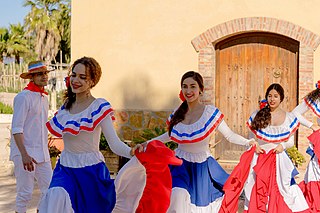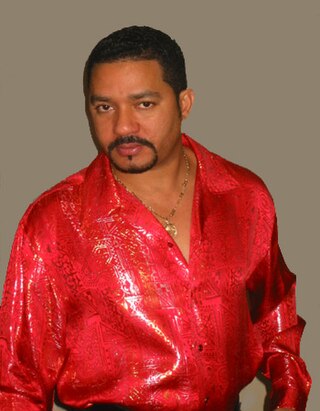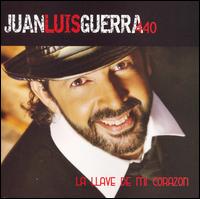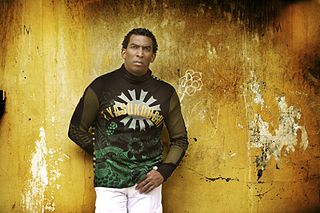
The music of the Dominican Republic is primarily influenced by Western European music, with Sub-Saharan African and native Taino influences. The Dominican Republic is mainly known for its merengue and bachata music, both of which are the most famous styles of music in the Dominican Republic, and have been exported and popularized around the world.

The Music of Puerto Rico has evolved as a heterogeneous and dynamic product of diverse cultural resources. The most conspicuous musical sources of Puerto Rico have primarily included African, Taino Indigenous, and European influences. Puerto Rican music culture today comprises a wide and rich variety of genres, ranging from essentially native genres such as bomba, jíbaro, seis, danza, and plena to more recent hybrid genres such as salsa, Latin trap and reggaeton. Broadly conceived, the realm of "Puerto Rican music" should naturally comprise the music culture of the millions of people of Puerto Rican descent who have lived in the United States, especially in New York City. Their music, from salsa to the boleros of Rafael Hernández, cannot be separated from the music culture of Puerto Rico itself.

Proyecto Uno is a Dominican-American hip hop/Merengue house group which helped popularize a style of music which blends merengue with techno, dancehall, reggae and hip-hop/rap music. The band was founded in New York City's East Side in 1989 by Nelson Zapata and managed by Porfirio "Popi" Piña. Originally formed as traditional merengue band, Proyecto Uno received recognition in the 1990s, the group won Billboard Latin Music Awards, Premios Lo Nuestro and was nominated for an Emmy award. The current members are Nelson Zapata, Kid G and Paolo Tondo. The manager of the group currently is Rafael Zapata III.

Akwid is a Mexican-American hip hop group combining hip hop-style vocals with regional Mexican music. An earlier incarnation of the group was known as Juvenile Style. Rappers Francisco "AK" Gómez and Sergio "Wikid" Gómez, who make up Akwid, are brothers originally from Jiquilpan, Michoacán, but grew up in Los Angeles, California. Before becoming Akwid both "AK" and "Wikid" were part of a former rap group named the "Head Knockerz" with other group members Sabu and John Doe
Bachatón is a fusion genre of reggaeton from Panama and Puerto Rico as well as bachata from the Dominican Republic. Bachaton combines bachata melodies and reggaeton style beats, lyrics, rapping, and disc jockeying. The word "bachatón" is a combination of "bachata" and "reggaeton". "Bachatón" was coined and widely accepted in 2005. It is a subgenre of reggaeton and bachata.

Fulanito is an American musical group based in Washington Heights in New York City. The group combines traditional merengue with elements of other genres such as house, hip hop, and bachata among others. With over five million albums sold throughout the world, they were at one time the top selling act in Colombia, and were placed on other charts including those of Japan, Switzerland, United States, and Chile. Their name means "Little John Doe" in Spanish. Members of Fulanito had previously been in popular groups such as 740 Boyz and 2 in a Room.

Frank Reyes is a Dominican singer. Known as the Prince of Bachata, he is regarded as one of the best known bachata artists of all time and famous throughout Latin America. He is a 7 time Bachata of the Year winner at the Soberano Awards, making him the most awarded artist in that category. He is known for hits like "Vine a Decirte Adios", "Con el Amor No Se Juega", "Tu Eres Ajena", "Nada De Nada", "Quién Eres Tu", "Princesa", "Amor a Distancia", "Decidí", among others.

La Llave de Mi Corazón is the 10th studio album recorded by Dominican singer-songwriter Juan Luis Guerra, It was released by EMI Televisa Music on March 20, 2007. It was Guerra's first album to contain songs in English since his 1994 recording of Fogarate. The album contains fusions of mambo and tropical rhythms that Guerra himself defined as "Mambo merengue". Its production and musical structure of album is based on merengue, bachata and salsa and encompasses elements of Blues, Son, Jazz, Mambo and Bossa Nova. The album was written, arranged and produced by Juan Luis Guerra and according to the artist is his most romantic album. It is composed of four merengues, two bachatas, three romantic songs and two salsas.

Toby Love is an American singer, rapper and songwriter of Puerto Rican descent. Based on The Bronx, New York, he is best known for being a former member of Aventura before pursuing a solo career, mostly known for their 2002 album We Broke the Rules, later performing a style of bachata music that combines traditional and urban singing and production. In 2006, he embarked on a solo career, thus gaining success. His debut single, "Tengo Un Amor", helped him rise to fame in mainstream Latin music. Since then, he became one of the most successful bachata artists of the 2000s and 2010s with hits like "Llorar Lloviendo", "Te Parece Poco", "Lejos", "Vestida De Blanco", among others.

Pedro René Peralta Soto, better known as Chichi Peralta, is a Dominican musician, songwriter, composer and producer.

"Se Acabo " is the second and final single from A Musical Massacre, a 1999 album by East Coast hip hop group The Beatnuts. It was released by Relativity Records in 1999 as a promo 12 inch and CD single. The song is produced by The Beatnuts and features Spanish raps by Juju, Psycho Les and two Merengue rappers: Swinger and Magic Juan. The track's slow-paced Latin beat samples "Se Acabo" by Marco Antonio Muñiz. An English remix of "Se Acabo" featuring Method Man can be found on The Beatnuts' 2001 album Take It or Squeeze It.

James Mui, known professionally as Chino Rodriguez, was an American musician and impresario that specialized in Latin music, salsa and Latin jazz.

"El Niágara en Bicicleta" is a song by Dominican Republic singer-songwriter Juan Luis Guerra and his band 4-40 from his eighth studio album, Ni Es lo Mismo Ni Es Igual (1998). The song was written and produced by Guerra. It was released as the third single from the album in 1999 by Karen Records. A merengue rap song, it sees the protagonist finding himself in a hospital that is in poor condition, based on Guerra's experience in one. The song received positive reactions from three music critics, who praised who praise its music and social conscious lyrics.
Merenhouse, merenrap or electronic merengue,Mambo o Mambo de Calle is a style of Dominican merengue music formed by blending with dancehall reggae and hip hop. The mix of Latin music, house music and dancehall started in NYC in the late 1980s.
Sandy & Papo MC, Sandy MC & MC Papo or simply Sandy & Papo, was a duo of merengue and hip hop music, with temporary residence in Venezuela. Its members were Sandy Carriello "Sandy MC" and Luis Deschamps "MC Papo", both from the Dominican Republic. The duo was created by Nelson Zapata and Pavel de Jesus, after attending an audition for Proyecto Uno.

Antonio Peter De la Rosa better known by his stage name Omega "El Fuerte" or simply Omega, is a Dominican singer and songwriter. He is a modern day merengue artist based in Santo Domingo, Dominican Republic. Since 2007, Omega has enjoyed increased popularity in the Dominican Republic and with Dominican-Americans across the United States. He has also penetrated music markets in Spain, Italy and Latin America.

Héctor Elpidio Acosta Restituyo, better known as Héctor Acosta "El Torito" or simply Héctor Acosta, is a Dominican singer of Merengue and bachata music. Acosta was the lead singer for the Dominican band Los Toros Band. They were mostly a merengue band who in the late 1990s started to perform bachata songs which would gain huge success. In the mid-2000s he continued as a solo artist and would gain bigger success with hits like "Me Voy", "Con Que Ojos", "Tu Primera Vez", "Me Duele La Cabeza", "Levántate", "Amorcito Enfermito", among others. Some of his hits have reached number one on the Billboard Tropical Songs chart. He has released seven studio albums in which three of them have been certified gold in the United States by the Recording Industry Association of America (RIAA). Acosta is considered one of Dominican music's greatest musicians.

Vicente García Guillén is a Dominican musician, singer and composer. He is the former lead singer of the Dominican alternative rock band Calor Urbano, which he left in 2010 to pursue a solo career. Garcia has collaborated in concerts with renowned artists such as Juan Luis Guerra, Alejandro Sanz, Cultura Profetica, Juanes, Ximena Sariñana and Maná among others. He has won three Latin Grammy awards including Best New Artist in 2017.
Urbano music or Latin urban is a transnational umbrella category including many different genres and styles. As an umbrella term it includes a wide and diverse set of genres and styles such as dancehall, dembow, urban champeta, funk carioca, Latin hip hop and reggaeton. The commercial breakthrough of this music took place in 2017 with artists from Colombia, Cuba, the Dominican Republic, Panama, Puerto Rico, the United States, Venezuela and even non-Spanish-speaking nations, such as Brazil, where Portuguese is spoken.














